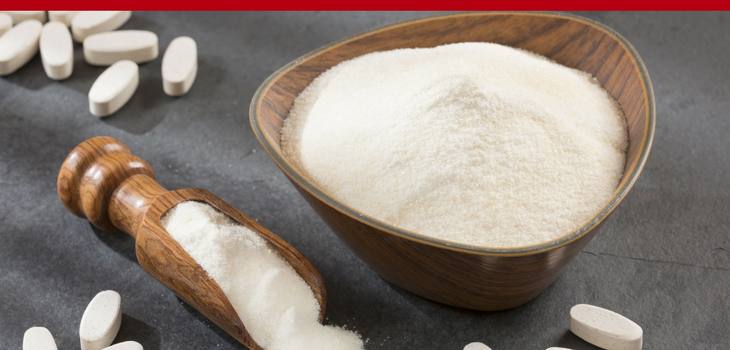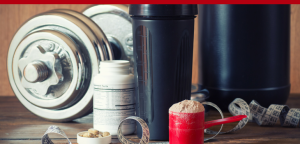by Ted Ryce
Getting file data...
In this article you’ll learn about this powerful superfood that fights wrinkles, helps you sleep better, eases joint pain and promotes better gut health.
Collagen is a hot topic right now. Collagen powders and bone broth are marketed as anti-aging panaceas. The marketing says it will help you improve your gut health, heal your injuries and keep your skin looking young.
But what exactly is collagen? Is it the new must-eat superfood? Or is it a hyped-up trend not worth your hard-earned cash? Here’s what you need to know.
Let’s start with talking about what collagen is.
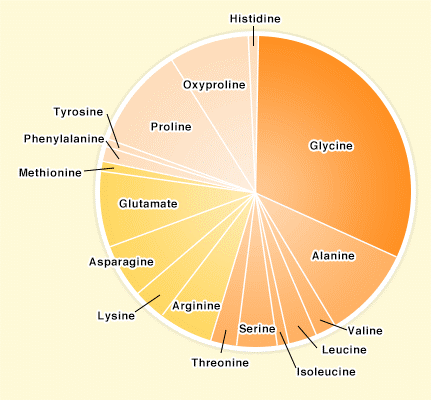
What Is Collagen?
The word “collagen” comes from the Greek word kolla—which means glue. That’s fitting because collagen is the most common protein in our body. And it helps the different parts of our body to “stick” together.
Collagen is found in your skin, tendons, cartilage, ligaments, and bone. We tend to think of calcium as the substance that makes up our bones. But your bones are mostly made from collagen.
It’s also abundant in your eyes, blood vessels, gut, intervertebral discs, and even in your teeth.
When your collagen levels are optimal, your skin, bones, and joints are stronger and more youthful.
And when your levels are low, you can end up with numerous health issues.
Simply put, collagen is a vital part of the body and a protein that we absolutely need.
But there’s just one problem: As we age, the body’s natural collagen production begins to slow down.
In addition to aging, poor lifestyle habits, such as smoking, eating the wrong foods, and being exposed to too much sun can deplete collagen levels as well.
At least 28 types of collagen have been identified. But 80 – 90 percent of the collagen in the body consists of types I, II, and III.
An important fact aspect of this important protein is that it’s 1/3 glycine. Keep this in mind as we’ll be returning to the importance of glycine again and again in this article.
If Collagen Is So Important, Why Don’t We Eat More Of It?
Chicken feet soup, blood pudding, chicken gizzard, brain tacos… Though these foods have been eaten around the world for many years, most Americans would say they belong on Fear Factor rather than their kitchen table.
The truth is that traditional diets are much higher in collagen than our modern diets.
Natural-living cultures wisely practiced eating all parts of animals from their nose to their tail. These organs and other parts are much higher in collagen and important nutrients than the foods we eat in our modern diet.
One thing that I’d like to share with you is that I always felt disingenuous when I talked about eating organ meats and other unusual animal parts. Like 99% of people in modern society, I mostly ate chicken breast and steak. I bought bone broth in an expensive pre-packaged carton. And the only “weird” animal part I’d eat is some liver on rare occasions.
Now that I’ve spent a month in Thailand, I can tell you this from experience.

Chicken gizzard soup in bone broth, anyone?
In my short time in Thailand, I’ve had fresh bone broth almost every day, chicken feet soup, chicken gizzard soup, shrimp chins and more.
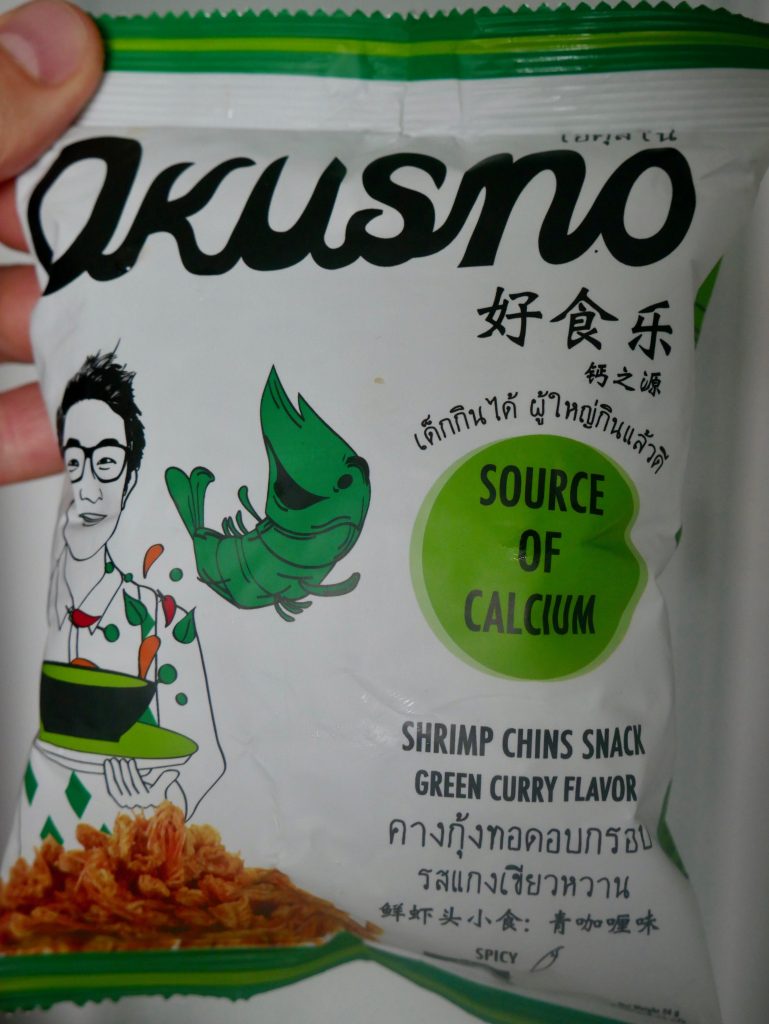
In the West, we’ve lost the practice of whole-animal eating. And if you’re a vegetarian or vegan, you typically don’t eat many (or any) animal products.
This is important because we are living in an age where chronic diseases are up to epidemic proportions. It’s more important than ever that we reconnect with the foods we choose to eat and the practices that we’ve lost through the industrialization of our food supply.
Taking control of your diet by preparing more foods fresh from home and learning to diversify the natural foods you eat can bring the power to prevent and even reverse disease.
And that’s what the Legendary Life Podcast is about—helping you to learn how to improve your health by eating the right things, adding daily movement to your routine and improving your sleep.
Need more proof that everyone needs a collagen supplement? Here are my five favorite benefits:

Benefit #1: Collagen Helps You Sleep
If you have trouble sleeping or if you wake up feeling sluggish, then the glycine in collagen may help.
Remember how I mentioned that collagen is one-third glycine? Well, glycine by itself has been found to improve both sleep quality and daytime performance.
A 2015 study published in the journal Neuropsychopharmacology found that glycine’s sleep-promoting effects are due to its calming effect on the nervous system helps and it helps lower your core body temperature at night.
A 2012 study in the journal Frontiers of Neurology found that glycine improved daytime performance in the sleep-restricted study participants.
So if you’re suffering from that “tired and wired” feeling at night, or if feel too hot when you’re trying to sleep, then taking either a collagen or glycine supplement is something you should try.
Studies examining glycine’s sleep-promoting effects on used 3 grams of glycine before bed. That would be about 10 grams of collagen (as collagen is 1/3 glycine).
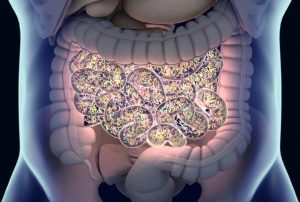
Benefit #2: Collagen Improves Gut Health And Reduces Inflammation
Like in most of our body, collagen makes up our gut’s connective tissue. It helps maintain the integrity of the protective lining of your digestive tract.
You may have heard of “leaky gut syndrome.” This is when the “tight junctions” in the lining of your gut malfunction. This lets particles like antigens and bacteria pass into your bloodstream and can result in issues like abnormal immune system responses and inflammatory bowel disease.
Tumor necrosis factor-α (TNFα) is a key proinflammatory cytokine regulating the function and structure of tight junctions of our digestive tract. A 2016 study in the journal FASEB collagen peptides protected the “tight junctions” in our gut lining from TNFα-induced dysfunction.
In general, glycine has been found to be helpful in numerous inflammatory conditions because of its anti-inflammatory, immunomodulatory and cytoprotective properties. So much so that a 2003 study concluded that:
“Multiple protective effects make glycine a promising treatment strategy for inflammatory diseases.”
In other words, since excessive inflammation affects everything from our joint health to our cardiovascular health, including more glycine-rich collagen, is a safe and effective way to help prevent chronic inflammation.

Benefit #3: Collagen May Heal Or Prevent Injuries
Studies showing the efficacy of oral collagen supplementation have been controversial. One group of scientists proposed that the digested supplement wouldn’t be able to get to the areas where you need them. One study examined the structure of collagen and concluded that oral supplements aren’t beneficial.
Then I found another study that changed everything.
A 2016 Australian study published in the American Journal of Clinical Nutrition investigated whether oral collagen and Vitamin C before exercise could increase the body’s natural production of collagen.
The gave the study participants a beverage containing 48mg of Vitamin C and either 0, 5, or 15 g of collagen protein. And the participants had no idea which drinks they received.
Afterward, they had the subjects perform the exercise (6 minutes of jumping rope). Then they tested the subjects to see at what point the digested collagen peaked in the blood.
You can read the study yourself for all the details HERE. But I’ll summarize the findings for you in case you don’t want to have your head explode from reading complicated scientific jargon and statistical analyses. You’re welcome
What they found was that 15 grams of collagen, but not 5 grams, was the dose that you needed in order to improve collagen synthesis in your tendons.
They also discovered that taking it 1 hour before exercise allowed the amino acids to peak in the blood while using exercise to drive them to the tissues that needed it.
If you want to listen to an interview with the lead researcher Keith Barr, he did an excellent interview on the Sigma Nutrition podcast.
After I heard that, I started experimenting with this protocol and I can tell you that I felt a noticeable difference in my joints. I had much less achiness and pain after a month of supplementation.
I think it’s also important to mention that I’ve tried many, many different supplements and methods to heal my aches and pains. 99% of them haven’t done anything but wasted my time and money.
If you’re suffering from an injury or joint aches, I highly recommend giving this supplementation strategy a try.

Benefit #4: Collagen Promotes Youthful, Healthy Skin
Collagen is the most abundant protein in our skin. As we age, our body’s natural ability to produce collagen declines leading to skin thinning and impaired function.
In other words, as you get older your production declines and you start to see fine lines, loose skin, and wrinkles.
But getting more collagen in your diet may improve your skin quality.
Check out this study…
A 2014 study published in the journal Skin Pharmacology and Physiology conducted a conducted a double-blind, placebo-controlled study investigating the effects of collagen peptides on skin quality.
They found that the groups taking collagen protein showed a statistically significantly higher skin elasticity level. Several other studies like this one and this one have found similar results.
It should be noted that some of these studies are manufacturer trials funded by companies selling collagen products. That doesn’t invalidate the research, but it’s important to keep in mind.
Although the gold standard for boosting collagen in the skin is vitamin C serums and creams containing vitamin A with ingredients like retinol and tretinoin, oral collagen supplements are promising for the skin. Oral collagen supplements are safe, inexpensive and have so many other benefits that it’s worth giving them a try.

Benefit #5: Collagen May Help You Live Longer
Since calorie restriction was first shown to extend the life lab rats in 1935, there have been numerous studies looking into why restricting calories led to a longer life.
However, many follow up studies showed that the time of calorie restriction onset, the timing of food intake as well as diet composition, played major roles in promoting health and longevity.
This broke the old dogma that only calorie intake is important for extending lifespan.
Upon further investigation, it was found eating less methionine-rich foods supported longevity by reducing mortality and incidence of age-associated diseases. This was a major breakthrough for longevity scientists since calorie restriction doesn’t always work for extending life.
They discovered that the less methionine there is in body tissues, the longer animals seem to live.
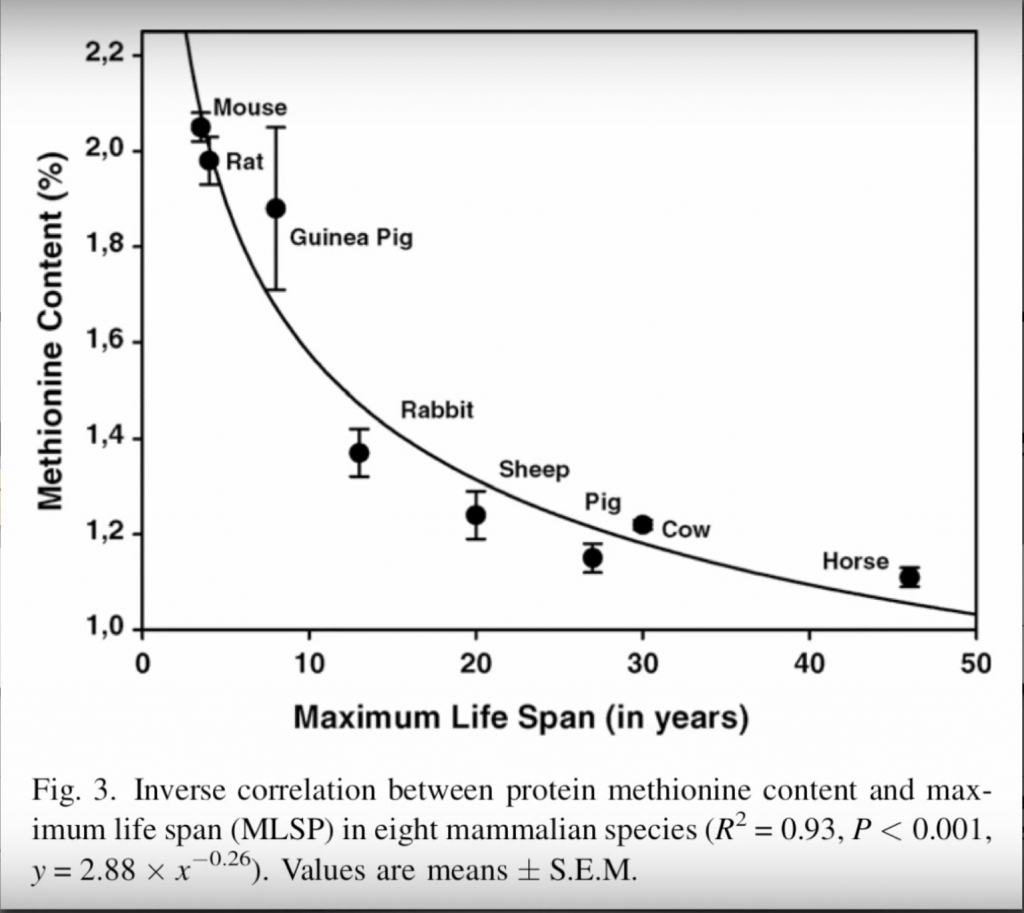
Then another interesting twist emerged. A 2011 study published in the journal FASEB found that supplementing the amino acid glycine gave the same results as restricting methionine in the diet.
In other words, we’ve already covered how our modern diets are based on mostly muscle meats like steak and chicken breasts. Muscle meats are rich in the amino acid methionine but relatively low in glycine.
So the typical modern diet has a constant imbalance between methionine and glycine.
Keep in mind that the majority of these longevity studies have been done on animals. And the results aren’t always practical or meaningful for humans.
That said, adding more glycine-rich foods to your diet is a safe and potentially effective way to reduce your risk of disease so you live longer and healthier.

How To Get More Collagen in Your Diet
- Drink more bone broth. It’s an excellent source of collagen. You can buy it premade like Kettle & Fire or make it yourself. Just make sure you get high-quality bone broth (or bones if you make your own). A 2012 study found high levels of lead in three different types chicken broth.
- Eat collagen-rich meats. Skin, gizzard, necks, ribs, cheeks, and feet are rich in collagen. You may have to get a little creative with your recipes, but the health benefits are worth it.
- Take a collagen supplement. The easiest way to get more collagen in your diet is simply to supplement it.
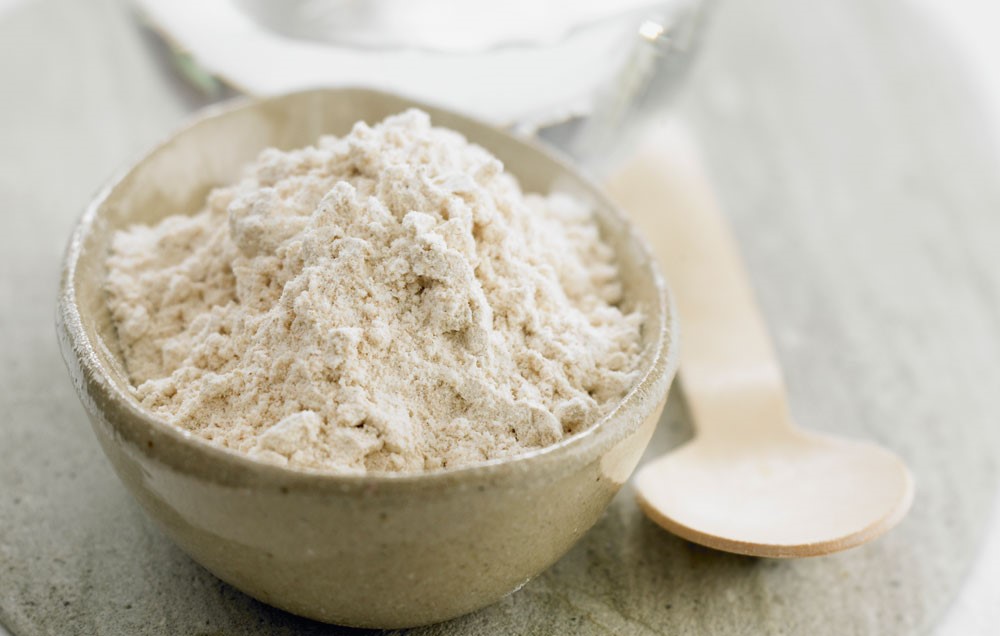
Which Collagen Supplement Should You Take?
I remember about 20 years ago when type-II-collagen pills from chicken were promoted as the miracle supplement for achy joints and damaged cartilage. I took a ton of this stuff and never noticed a difference.
I’ve also taken many other joint care supplements on and off over the years. But it wasn’t until I started experimenting with taking large doses of hydrolyzed collagen powder that I started to feel a difference.
My joints ached less, my sleep improved and my skin started to glow with a radiance that garnered praise from all. Okay, okay so maybe the last part didn’t happen.
I think my skin looked a little better but I don’t have a lot of wrinkles, to begin with. But I definitely noticed a huge difference in my joints and an improvement in my sleep.
By now you’re probably sold on at least giving collagen a try and you’re wondering which supplements are best. That’s exactly what we’ll dive into next.
The 5 Best Collagen Supplements
1. Vital Proteins Wild-Caught Marine Collagen
My first choice is Vital Proteins wild-caught marine collagen.
Fish collagen is at the top of my list for collagen supplements. It’s absorbed up to 1.5 times more efficiently into the body, meaning that it has superior bioavailability over collagen from beef or chicken.
Another potential issue with beef collagen is the potential for developing diseases such as “mad cow”, and foot and mouth disease. Although it’s not clear how big the risk is, you completely eliminate it by using a fish-sourced supplement.
It’s more expensive than other supplements, but it’s worth the money if you can afford it.
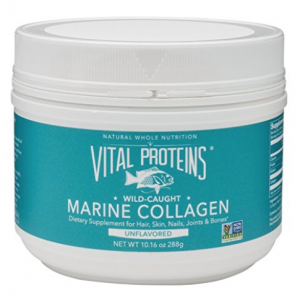
Buy now: Vital Proteins Marine Collagen ($49, Amazon)
2. Vital Proteins Pasture-Raised, Grass-Fed Hydrolyzed Collagen Peptides
My second choice is Vital Proteins collagen peptides from pasture-raised, grass-fed cows.
This product has two distinct benefits. The first is that it’s a peptide supplement instead of hydrolyzed. For some people, this will be easier on their digestive system. Or if the smell of hydrolyzed collagen really gets to you, then consider this product.
The second benefit is that it’s sourced from pasture-raised, grass-fed cows. This (hopefully) cuts down on the risk of heavy metal contamination and risk of diseases like mad cow.
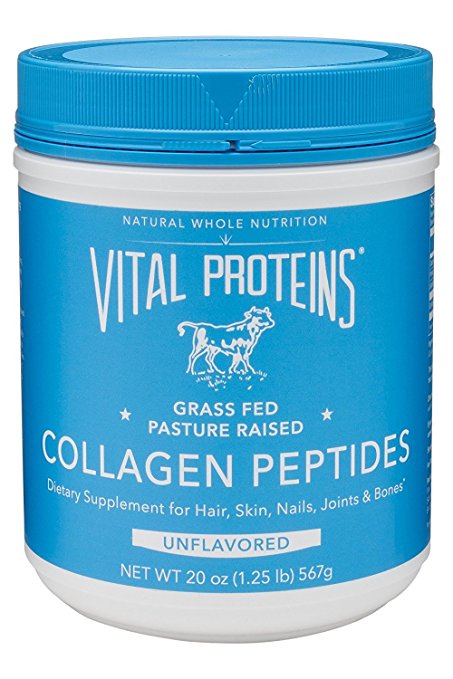
Buy now: Vital Proteins Collagen Peptides ($43, Amazon)
3. Great Lakes Grass-Fed Collagen Hydrolysate
This is the tried-and-true supplement that I’ve been using for years and has over 5000 mostly positive reviews on Amazon.
It’s the least expensive but still high quality. Personally, I wouldn’t recommend purchasing any of the cheaper supplements.
I don’t trust supplement companies in general. It’s too easy to use cheap raw materials, then spend all your money on marketing to consumers who are attracted to the splashy brand logos and taglines. That’s the norm for the industry so keep that in mind.
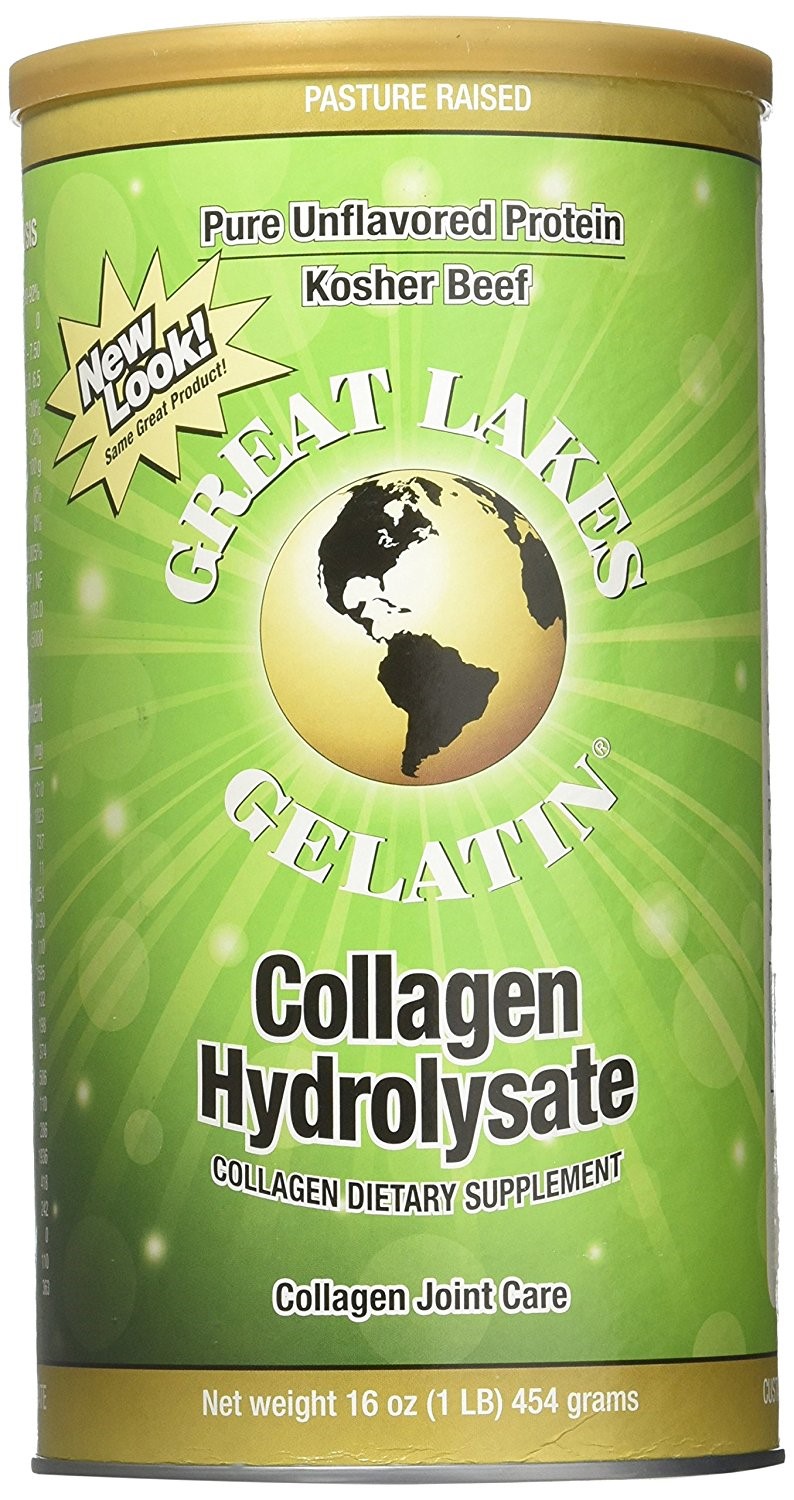
Buy now: Great Lakes Collagen Hydrolysate ($23, Amazon)
4. BulkSupplements Pure Glycine Powder
For those of you looking to get more glycine in your diet for improved sleep, I recommend that you also give BulkSupplements glycine powder a try. Personally, I like taking collagen during the day—especially before exercise—then taking glycine before I go to bed. This has been a powerful combination that has resulted in less joint aches and pains as well as improved sleep quality. BulkSupplements is a solid company and their glycine is inexpensive.
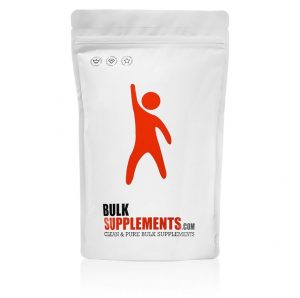
Buy now: Pure Glycine Powder ($18.96 Amazon)
5. Kettle & Fire Organic Bone Broth
It’s easier and less expensive to take a collagen supplement. But I know some of you will want to go the whole food route.
It’s much cheaper to make your own bone broth but it takes hours of work. And there’s a good chance you’ll stink up your house in the process.
That’s why I recommend Kettle & Fire Organic Bone Broth. It tastes delicious and works great as a base for soups and stews. Or you can just warm it up and drink a cup of broth.
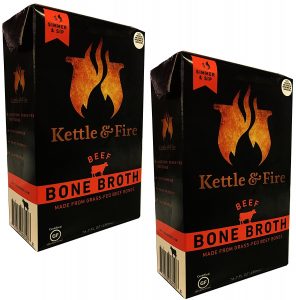
Buy now: Kettle & Fire Organic Bone Broth ($11, Amazon)
How Much Collagen Should You Take?
Now that you know about the top collagen products (at least the ones I’ve tried). So let’s talk about how much collagen you should take.
- For bone and joint injuries take 15 grams of collagen along with 50 milligrams of vitamin C. Do this one hour before exercise. This will improve healing for injuries and will improve connective tissue strength. I’ve been doing this daily. This is what researcher Keith Barr recommended in his Sigma Nutrition interview.
- For healthy skin, hair and nails my recommendation is to take 5 to 10 grams of collagen every day.
- For improved sleep, my recommendation is to take 10 grams of collagen or 3 grams of glycine before bed. Remember collagen is 1/3 glycine. So taking 10 grams of collagen will yield about 3 grams of glycine.
Unfortunately, you’ll have to experiment a little with the amount of collagen you take to get the best results.

Are There Side Effects Of Taking Too Much Collagen?
You’re probably wondering if there are any potential side effects of taking too much collagen. I’m interested in this myself.
Here’s what I discovered…
The FDA doesn’t step in and take a look unless it’s a special situation. For example, if a supplement company makes a medical claim about their product or people report getting sick.
Because this is the case, your first priority should be to look for a supplement checked for contaminants by a credible third-party consumer safety group like NSF.
That’s why I recommend Vital Proteins products. Their collagen peptides product has the NSF has certification on it.
Another issue with taking collagen supplements are the possible side effects.
According to MedlinePlus, a website supported by the National Institutes of Health, collagen supplements can cause:
“…an unpleasant taste, a sensation of heaviness in the stomach, bloating, heartburn, and belching. Gelatin can cause allergic reactions in some people.”
MedlinePlus also talks about the possibility that unsafe manufacturing practices might lead to contamination of gelatin products.
I’ve never personally experienced anything but good results from taking collagen protein. But I’ve heard of digestive issues from some of my clients. So here’s what I recommend based on your digestive strength:
- Strong digestive system: regular gelatin, collagen hydrolysate, collagen peptides and bone broth
- Weak digestive system: collagen peptides, bone broth
- Very weak digestive system: bone broth
Also taking your collagen supplement with a meal should help too.
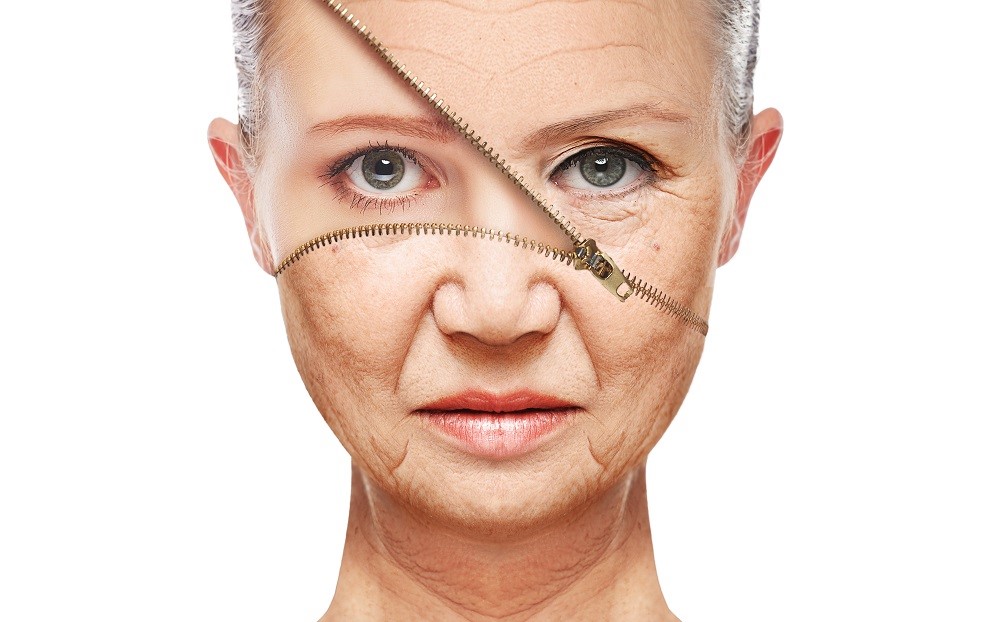
The Bottom Line
Adding collagen to your diet will improve your health. You should expect better gut health, reduced inflammation, improved sleep, and less joint aches. It may even help you live longer.
It’s not a magic pill, but it can definitely help you improve your body and health. And who doesn’t want to have better skin, better sleep and live longer?
There are also plenty of natural ways to get your daily dose of this superstar nutrient each day. Eat a well-balanced diet that includes bone broth or collagen-rich animal products such gizzard, tendon, chicken, and pig feet.
The second (and easiest) way to add more collagen is to take a supplement. If you choose the second one, I’ve already listed my favorite brands. Time to try out adding it to your daily routine and reap the benefits.
Have you tried any collagen supplements? Did you notice a difference in your body? Leave a comment below and let me know.
Want help becoming the healthiest, fittest, strongest version of yourself 3X faster?
Most people over 40 know that exercise, eating well, and quality sleep are important for looking and feeling better. Yet they need help applying that knowledge in the context of their busy, sometimes stressful lives.
If you’ve recently tried to follow a workout program that you used to do in your twenties, you probably noticed that it isn’t as effective as it used to be! When you are in your late 30s, 40s, and 50s, you need a workout designed for your age and lifestyle. So, you can exercise without straining your body, feeling exhausted afterwards or even getting injured and taking too many days to recover.
My 6-week customized workouts are designed to make you workout smarter, not harder.This is a program specifically designed for people over 40 is packed with everything you need to k to finally create that leaner, fitter, and healthier body that you’ve always wanted.
PLUS: If you buy in the next 48 hours, you’ll have direct access to me and you can ask all your burning questions in this one coaching email that you get as a bonus. Also, I’ll give you specific advice for nutrition and supplementation, so you can get results faster.



